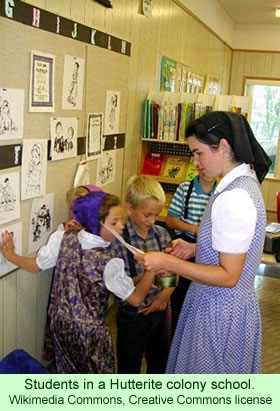A South Dakota school district has purchased iPads for the children at a Hutterite colony school, and apparently the colony leaders are quite supportive. It hardly needs to be said that the kids are thrilled, even if the reasons for the purchase of the devices were not all that positive.
 The school at the Wolf Creek Colony was in trouble. It is located about 10 miles west of the small town of Freeman and 45 miles west southwest of Sioux Falls, which is near the southeastern corner of South Dakota. The problem was that student test scores in the school had fallen—they were at, or below, the 5 percent level compared to the rest of the state.
The school at the Wolf Creek Colony was in trouble. It is located about 10 miles west of the small town of Freeman and 45 miles west southwest of Sioux Falls, which is near the southeastern corner of South Dakota. The problem was that student test scores in the school had fallen—they were at, or below, the 5 percent level compared to the rest of the state.
According to a news report last week, the South Dakota Department of Education had identified Wolf Creek as a “priority school.” The designation resulted from the abysmal test scores, and it required a probationary period for the school. It had to initiate a carefully formulated program for improvement, or else. If the performances by the children do not improve within four years, the state reserves the right to intervene with more severe measures.
The school district in Freeman, of which Wolf Creek is a part, quickly worked with colony elders and state officials to formulate a plan to reverse the decline. One of the first things the school did was to open Internet access in the fall of 2013. After a year, the results seem to be positive. Part of the credit appears to go to the technology that the district put into place.
The two teachers interviewed by the news reporter make different uses of the new devices, differences which are appropriate to the ages of their pupils. Melissa Deckert, who teaches the grade 4 to 8 class, has integrated the new iPads into the regular activities of the students. She told the reporter that the young Hutterites use the iPads to supplement their work in an Accelerated Reader program. After the kids read books that are at their own levels, they then answer questions about them. The children earn points based on how well they perform on the quizzes.
Deckert clearly understands the ways children work—she’s been a teacher in the colony school for 14 years. She sets classroom goals, then she sets goals for each student. But the clincher is the reward for meeting those goals: “The students are working toward earning enough points for a pizza party by Thanksgiving.” The U.S. will celebrate Thanksgiving on November 27 this year.
The teacher describes other programs that the students can use with their iPads. They use them with a program called enVision, which adds visual animation to math lessons, thus helping the kids understand the workings of mathematics. The students also play educational games in her classroom to reinforce what they are learning.
Jennifer Tande teaches the K-3 classroom and she does not yet use the iPads in her room as much as Ms. Deckert does. But she does incorporate them into the weekly class schedule. The kids use them occasionally throughout each week, especially the reading apps. As a reward for good work during the week, the children have Friday afternoons with the new devices. “The kids love them,” she emphasizes.
Tande indicates that it is difficult to find apps that are appropriate for the younger grades, but she thinks that they will be important to the teaching program of the school. She especially believes in the reward feature of the new devices. “If they’re doing really well on their assignments they can go ahead and get out their iPads. That’s the biggest way I use it, as more of an incentive.”
Other changes made by the school to meet the demands of the state supervisors have been to add a second full-time teacher to the school, to add a part time paraprofessional, to extend the school day by 30 minutes, to update the curriculum, and to make school attendance more clearly required. The school also started holding monthly meetings that include the teachers, Shane Voss, the elementary supervisor in Freeman, and a representative from the state. The purpose of the meetings is to review and analyze the goals that have been set and the results of measures taken to achieve them.
Voss told the school board at a recent monthly meeting that the efforts have resulted in real improvements. The school had made enough progress in year one of its plan that the state has approved its work and the school is allowed to move on to year two. Voss gives a lot of credit for the improvements to the leadership and support from the Wolf Creek Colony. “The biggest thing has been getting [colony] leadership to buy into what it is we’re trying to do out there, and I think they have,” he said. “We’ve built a good relationship.”